
The National Interest Foundation Newsletter
Issue 263, November 27, 2024
Welcome to our NIF Newsletter. We hope that everyone has a wonderful Thanksgiving. In this week’s edition, we provide analysis on President-elect Trump’s foreign policy/national security cabinet picks and their international implications.
Editor: Bassam Tarbush
Trump’s Foreign Policy/National Security Cabinet Picks and International Implications

Experts and former officials have noted the lack of qualifications and controversial nature of various cabinet picks. (Photo from AP)
Trump’s Foreign Policy/National Security Cabinet Picks and International Implications
By NIF Staff
Since his election victory just three weeks ago, President-elect Trump has continued to announce new cabinet appointments, some of which have been mired in controversy and met with considerable criticism. Those that have elicited particular concern include Trump’s selection of far-right Islamophobe Sebastian Gorka for a senior national security position, Tulsi Gabbard as the pick to be director of national intelligence, and television presenter Pete Hegseth’s nomination for U.S. Secretary of Defense, among other questionable appointees such as Mike Huckabee, Pam Bondi, and Linda McMahon. Various picks like these have received pushback from both sides of the aisle, including disapproving responses from former Trump administration officials, who have sought to draw attention to the shortage of qualified appointees in Trump’s incoming second presidential administration – a few of whom have been deemed detrimental to U.S. foreign policy and national security.
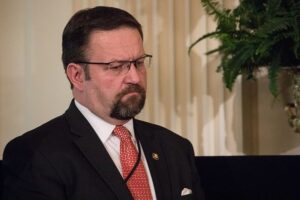
Gorka has been named to become Deputy Assistant to the President and Senior Director for Counterterrorism. (Photo from Getty Images)
Former Trump administration aide Sebastian Gorka has been selected as Trump’s pick for deputy assistant and senior director for counterterrorism within the White House National Security Council. Gorka’s alt-right background and association with fringe groups have raised concerns from policymakers. During Trump’s first term, Gorka was denounced for an incident in which he wore the medal of the Vitezi Rend to a White House inaugural ball. The Vitezi Rend is a Hungarian far-right group with historical ties to the Nazis, including collaboration in the Holocaust. Gorka has also been criticized for his anti-Arab sentiments and his Islamophobia. Former U.S. officials Steven Simon and Daniel Benjamin, who served in national security and counterterrorism roles in the American government, stated “Gorka sees Islam as the problem, rather than the uses to which Islam has been put by violent extremists.” This month, in an interview on RT News, Gorka had stated “There is no such thing as Palestine.” Gorka’s qualifications have also long been put into question by a variety of experts in the field. When Trump appointed him during his first term in 2017, Gorka’s PhD advisor had stated that he “would not call him an expert in terrorism” saying “his level of expertise does not match the level where he stands in the White House.” Gorka’s qualifications have also been criticized since, so far as even being called a “con man” by John Bolton – the former U.N. ambassador who was Trump’s third national security adviser in his first term – who suggested that “he needs a full-field FBI background investigation.”
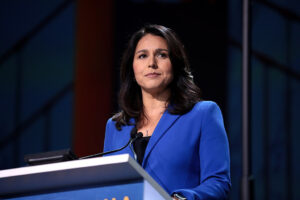
Trump has selected Gabbard as Director of National Intelligence. (Photo from AP)
Donald Trump’s choice of Tulsi Gabbard, an isolationist who has been accused by many of spreading Russian propaganda, to be director of national intelligence (DNI) has also raised concerns about her relationship with the ruling regimes in Russia, Syria, and India. On the topic of Syria, Gabbard has been accused of being soft on dictator Bashar al-Assad, who has initiated a brutal repression campaign against the Syrian people in response to the calls for democratic reform in the country. Additionally, some security officials have questioned Gabbard’s history of unusual travel, including meeting with Assad outside of official channels as a member of Congress. Regarding Russia and Ukraine, only three days after Russia began its full-scale invasion of Ukraine, Gabbard called for “Presidents Putin, Zelensky, and Biden…to put geopolitics aside and embrace the spirit of aloha.” Later that year, she tweeted a conspiracy theory about U.S.-funded Biolabs in Ukraine, which prompted Republicans Adam Kinzinger and Mitt Romney to call out Gabbard for spreading Russian propaganda. As DNI, she would oversee 18 agencies, including the FBI, CIA, and NSA. While Gabbard has prior military experience, she does not have any relating to intelligence. A former Democrat, she left the party in 2022. During the 2024 presidential campaign, she became one of Trump’s most vocal supporters, and thus, her nomination is seen by many as a reward for her support.
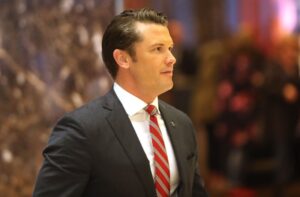
Hegseth is Trump’s choice to be the next U.S. Secretary of Defense. (Photo from Getty Images)
President-elect Trump has nominated television presenter Pete Hegseth for U.S. Secretary of Defense. Hegseth has some military experience, given his time as an officer in the Minnesota National Guard where he deployed to Guantanamo Bay, Iraq, and Afghanistan; however, he is mostly known for his time on Fox News, having been a political commentator over the past decade. Hegseth has been a vocal supporter of Trump since 2016. He has disapproved of efforts to address extremism in the U.S. military, and has also criticized women in combat roles and threatened to remove them. Legitimate concerns exist over his past, which includes encouraging the president to use his executive authority to pardon U.S. soldiers accused of serious war crime charges. During Trump’s first term in office, Hegseth lobbied for pardons of soldiers facing charges over war crimes in Iraq and Afghanistan, saying “They’re not war criminals, they’re warriors.” If he is confirmed as Secretary of Defense, analysts and experts fear that he could politicize the armed forces during a time of profound global military uncertainty.
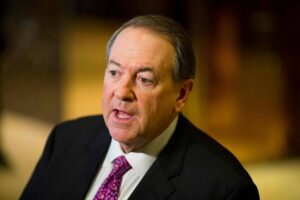
Huckabee has been tapped to be Trump’s U.S. Ambassador to Israel. (Photo from AFP)
Another of Trump’s cabinet picks that has raised eyebrows is his selection of former Arkansas Governor Mike Huckabee as the U.S. Ambassador to Israel. Huckabee is an outspoken supporter of Israel and its extremist government, and is fully in favor of illegal Israeli settlements in the West Bank. In January of 2017, speaking at an event, he promised to “Build Israel Great Again” and expressed that “there is no such thing as a West Bank.” With Huckabee installed in the position, Israel would only be further encouraged to forcibly take land and build more illegal settlements. Some also fear that Huckabee will allow and recognize Israeli annexation of parts of the West Bank, despite international calls for Israeli withdrawal, including an ICJ ruling this past July which found the occupation illegal under international law. Huckabee’s view of “peace” in the Middle East will not be attempted through fair negotiation, but instead forced through by favoring Israel at the expense of impartiality. During his first term, Trump recognized Jerusalem as the Israeli capital and moved the U.S. embassy there from Tel Aviv, both of which alarmed peace and social justice advocates. Huckabee’s appointment will only further this trend of Israel getting what it wants without fair compromise.
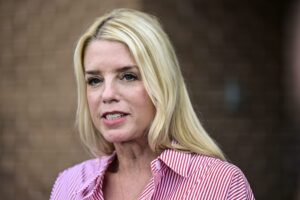
Trump has nominated Pam Bondi for Attorney General after Matt Gaetz’s withdrawal. (Photo from AP)
Following Matt Gaetz’s withdrawal from his appointment as U.S. Attorney General on November 21st, after facing opposition from many GOP members who voiced concerns about a past investigation of him by the Department of Justice (DOJ) and the results of an unreleased House Ethics Committee report, President-elect Trump nominated Pam Bondi in Gaetz’s place. Bondi served as Florida’s Attorney General from 2011 to 2019, and is known as an avid Trump loyalist who was one of his lawyers during his first impeachment trial back in 2019. Bondi also served on Trump’s Commission on Combating Drug Addiction and the Opioid Crisis during his first presidential term and supported the repeatedly debunked claims of voter fraud in the 2020 election. All signs show that Bondi will be a loyal ally of Trump’s plans for the Justice Department. Her top priorities in the role are likely to be clearing challenges to mass deportations, pardoning Trump supporters for their involvement in the January 6th attack on the U.S. Capitol, and preparing legal retribution through investigations against those who Trump deems as political opponents.
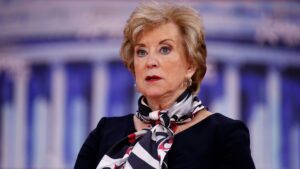
McMahon has been appointed to be U.S. Secretary of Education. (Photo from AP)
Trump has also appointed Linda McMahon as U.S. Secretary of Education, another in a slew of loyal patrons. McMahon has worked for Trump before, most recently co-chairing his 2024 presidential campaign and chairing the Small Business Administration during his first term. Upon her appointment, McMahon was met with backlash from critics who described her as unqualified and insufficient for the position. National Education Association President Beck Pringle remarked about the appointment saying “By selecting Linda McMahon, Donald Trump is showing that he could not care less about our students’ futures…McMahon’s only mission is to eliminate the Department of Education and take away taxpayer dollars from public schools, where 90% of students – and 95% of students with disabilities – learn.” Experts expect Trump to try and reform the Department of Education under McMahon.
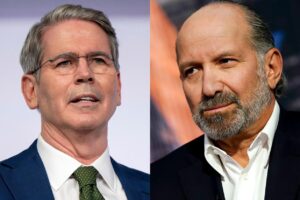
Bessent (left) has been appointed as Secretary of Treasury, and Lutnick (right) has been named as Secretary of Commerce. (Photo from AP)
Trump has announced a few of his appointments for key offices responsible for executing his planned economic policies. Recently, Trump named Cantor Fitzgerald CEO Howard Lutnick as his pick for Secretary of Commerce, who has most recently served as the co-chair of Trump’s presidential transition team since August. Lutnick had been contending with billionaire hedge fund manager Scott Bessent over the role. Trump ended up appointing Bessent as his Secretary of the Treasury, to the relief of business leaders and markets alike, in reference to his expertise and expected bipartisanship. Analysts hope Bessent will moderate some of Trump’s harsh economic policies, such as his widespread tariffs, but as Trump’s last term showed, decisions will ultimately be up to himself. Trump’s courting of the financial elite into key economic offices should be an indicator of who is expected to benefit from his proposed tax cuts.
For implications with the United States’ neighbors, earlier this week on Truth Social, Trump announced that on his first day, he would impose new tariffs on Mexico, China, and Canada, the United States’ three largest trading partners. In his post, he said “On January 20th, as one of my many first executive orders, I will sign all necessary documents to charge Mexico and Canada a 25% Tariff on ALL products coming into the United States, and its ridiculous open borders.” For China, he stated that they would pay “an additional 10% tariff, above any additional tariffs” until Beijing takes stronger action to stop the flow of chemicals used by Mexican cartels to produce fentanyl which ends up in the United States – something that Chinese leaders say they are already doing but which Trump clearly disputes. Trump’s proposed tariff against the United States’ two neighbors would violate the U.S.-Mexico-Canada Agreement (USMCA), a deal that Trump signed into law during his first term in office.
Trump is likely attempting to hold the threat of tariffs to force Canada and particularly Mexico to take more decisive actions on fentanyl and migration. The USMCA is set to be renegotiated in 2026. However, Trump’s threats could force an earlier renegotiation. So far, many predict that Trump’s tariffs will be used as threats to force countries to renegotiate deals with the United States. This includes William Reinsch, a former National Foreign Trade Council president, who remarked that “This strikes me more as a threat than anything else.” Regardless, if a new deal cannot be reached, Trump is risking trade wars with America’s most significant partners. Mexican President Claudia Sheinbaum has already said that her country would respond to Trump’s tariffs with its own tariffs, saying that “One tariff would be followed by another in response, and so on until we put at risk common businesses.” Given that Sheinbaum and Trump possess ideological differences, this could strain Mexican and American relations as well.
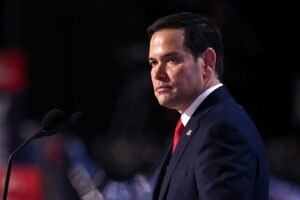
Rubio has been nominated by Trump to be his U.S. Secretary of State. (Photo from AP)
President-elect Trump’s nominated choice for U.S. Secretary of State Marco Rubio is expected to bring a more hardline stance to the United States’ foreign policy towards Latin America. According to Dr. Juan Gabriel Tokatlian, an International Relations expert at Universidad Torcuato Di Tella in Buenos Aires, the U.S. will exercise the Monroe Doctrine and seek to emphasize hegemony in the Western hemisphere. He expressed that “There are signals, at least, that this may be a rehearsal of the Monroe Doctrine at least in terms of positioning of the United States with this all together [being] in the context of what he [Rubio] sees as a growing challenge of a malign foreign power…China.” Rubio will likely be responsible for undertaking a large-scale effort to reinforce U.S. prowess in the region, including potential increases in trade and cooperation. The administration is also likely to attempt to garner support and entry from right-wing leaders like Argentina’s Milei and El Salvador’s Bukelei to combat ever-spreading Chinese influence.
The return of Trump is anticipated to have repercussions across the Atlantic as well. In Brussels, the main headquarters of the European Union, Ursula von der Leyen’s second term win in July gave most European politicians a sigh of relief as it was seen as a sign of continuation and stability. However, Trump’s return to Washington has thrown a wrench into that. Trump harshly criticizes NATO’s current financial situation and the EU’s trade surplus with the United States, and therefore, his priorities with Europe are likely to include making sure all NATO members increase their spending and burden sharing – which will consist of meeting the 2% of GDP military spending target. This could come under the threat of the U.S. pulling out of NATO and higher tariffs if European governments do not agree to new deals that Trump finds favorable.
Tensions also continue to rise over the Russo-Ukrainian War, a conflict that Trump has promised to end. However, this is a task that has only become more complex. Ukraine continues to insist on the “territorial integrity” of Ukraine and NATO membership as the basis for peace. At the same time, Russia has vowed not to surrender an inch of conquered territory and to not allow Ukraine to join NATO. Fighting in recent weeks has only escalated, with reports of North Korean troops fighting with Russia, and Ukraine now firing long-ranged British and American missiles into Russian territory. On November 22nd, Trump met with NATO Secretary-General Mark Rutte, and they discussed the range of global security issues facing the alliance. It is likely that Trump will change the U.S. approach to Ukraine and NATO, but less certain if, and possibly how, Trump might approach Russian aggression elsewhere. For example, Poland appears to be seeking to secure an alliance within NATO, including the United Kingdom, France, and the Nordic and Baltic states, to keep up support for Ukraine even if the United States under Trump backs out. If Trump attempts to push through a deal with Russia while simultaneously European NATO members continue to push forward with support for Ukraine, it risks breaking NATO in half between those seeking an immediate cessation of hostilities and others who want to support Ukraine for as long as it can hold out.
Lastly, Trump is expected to take a differing approach on climate change compared to the current Biden administration. Trump has promised to drive down inflation by increasing American energy production and significantly expanding fossil fuel production, vowing to allow American energy companies to “drill, baby, drill.” President-elect Trump has nominated Chris Wright, a fracking company executive and outspoken critic of climate change, as Secretary of Energy, who has expressed that “There is no climate crisis, and we’re not in the midst of an energy transition either.” As mentioned in a prior edition of our NIF newsletter which covered the COP29 conference, Trump’s scaling back of the United States from efforts to address the climate crisis could lead to anger and frustration in the developing world – which is already dealing with the adverse effects of climate change at a greater scale than more developed countries while also being less equipped to deal with them. This may very well prompt nations to turn to China, which has been expanding its role in the developing world and might therefore solidify itself as the global leader in renewable energy.
Enter the text or HTML code here
